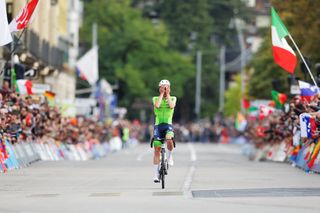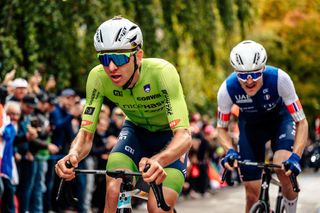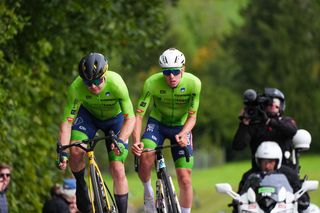'I clearly flew too close to the sun' – Awe and resignation in Zurich as Tadej Pogačar burns off Worlds field
Peloton acknowledges that new world champion was simply in a race of his own

The results sheet doesn’t record it, but the story of a day like this could never be fully told by a simple list of names and numbers. In decades to come, Pavel Sivakov will occupy his own modest place in the legend of Tadej Pogačar’s outrageous solo victory at the World Championships in Zurich. He was the last man standing.
Even though this era of cycling often seems unrecognisable from those that have come before, there are always some faint echoes of the sport’s history. In Lugano in 1953, Fausto Coppi had Germain Derycke in tow for much of his indelible raid, with the Belgian eventually distanced after repeated ascents of the Crespera. In Sallanches in 1980, Gianbattista Baronchelli managed to resist Bernard Hinault’s onslaught as far as the final ascent of the Côte de Domancy.
Derycke and Baronchelli at least had their resistance rewarded with a silver medal. Sivakov’s only prize here for hanging on for a whole lap was the knowledge that he will one day be a footnote in the folklore that will build up around Pogačar’s exhibition.
Sivakov was part of the break when Pogačar surprisingly bridged across to them after his attack with 101km to go, and he was the only one of their number with enough reserves to live in the same postcode as the Slovenian when he accelerated again on the steep Zürichbergstrasse with a shade under three laps remaining.
“When Tadej came up to us, I really believed in a medal, and when he attacked on the climb, I gave everything,” Sivakov said when he stopped in the mixed zone afterwards. “I tried to follow him, but I clearly flew too close to the sun. His level is incredible.”
The Frenchman gamely spent the following lap battling to keep pace with Pogačar before he finally relented on the next time up the Zürichbergstrasse with 51km to go. From there, he drifted back through a field that had fractured completely. He would end the day 6:40 down in 35th place.

When Derycke reached out to touch the flame all those years ago in Lugano, legend has it that Coppi brusquely demanded that he come through and take his pulls on the front. Derycke’s reported response was blunt: “You’re the Campionissimo, it’s up to you.”
Get The Leadout Newsletter
The latest race content, interviews, features, reviews and expert buying guides, direct to your inbox!
The rapport here between Sivakov and Pogačar, companions the rest of the year at UAE Team Emirates, was altogether more cordial. Pogačar visibly slowed atop Zürichbergstrasse with 77km remaining on realising that his trade teammate was the only man tracking him.
“He wouldn’t have done that if I wasn’t on UAE too, but I managed to stay on his wheel,” Sivakov said. “Once we got over the climb, I said I’d try to recover but I was never really able to do it. I never saw anything like it. Whether it was downhill or on the flat, I was never able to recover.”
Sivakov was part of the guard that helped Pogačar to Tour de France victory in July, and the Slovenian clearly saw him an ally of circumstance here as he looked to complete the final leg of his Triple Crown. At this speed, however, Pogačar’s slipstream was like a mirage in a desert for Sivakov. The shelter it offered was only ever an illusion.
“He said, ‘Come on, let’s ride together, they’ll maybe watch one another behind,” Sivakov said. “But it’s just so easy for him. Me, I was à bloc on his wheel.”
Early in the penultimate lap, Sivakov had to yield to the inevitable and let the wheel go. His part in Pogačar’s latest epic was over.
Over 100km
Sivakov was the last man to see Pogačar, but he wasn’t the only rider to try to follow the world champion during a raid that began on the climb to Witikon with a little over 100km remaining. Although Ben O’Connor (Australia) and Mathieu van der Poel (Netherlands) would share the podium with Pogačar, the riders who chased him most doggedly in the final two hours of racing were Ben Healy (Ireland) and Toms Skujins (Latvia).
There were still more than two laps to go when Healy launched his counter-attack, and Pogačar’s lead had stabilised around the one-minute mark. But even with all that distance left to run, Healy was resigned to the inexorable logic of this race and this season. The rainbow jersey already belonged to Pogačar.
“I was always just racing for second,” said Healy, who came home with the chasers in 7th place. “I don’t think I was ever getting back to Tadej, to be honest.”
Van der Poel later wondered if Pogačar’s move had come from a place of panic. With Domen Novak and Primoz Roglič the only Slovenian riders still in the main peloton, Pogačar may have figured attack was the best form of defence. After he jumped, Jan Tratnik dropped back from the break to help him bridge across.

“I think it was just a pretty tough moment in the race. He went and I think everyone wasn’t expecting it,” Healy said. “When the whole Belgian team was chasing him down, we thought maybe this was a bit much even for Tadej, but he proved us wrong again.”
Another eyewitness to Pogačar’s attack was O’Connor, who was sitting directly behind him on the Witikon. He briefly tracked the acceleration before thinking better of it, perhaps scarred by the experience of following Pogačar at Oropa on the Giro d’Italia.
“I was actually on his wheel when launched,” O’Connor said. “I tried to go with him for a little bit and thought there was no point. He’s the best in the world, and that’s how it is in modern cycling.”
Not everybody was immediately resigned to Pogačar’s superiority. Andrea Bagioli (Italy) and Quinn Simmons (USA) attempted to go with the move, but they quickly realised Pogačar was travelling to a place they simply couldn’t reach. Even as Simmons followed, an old war story from Lidl-Trek teammate Mattias Skjelmose about following Pogačar was nagging at the back of his mind.
“Mattias said, ‘When you go close to the sun, you get burnt,’” Simmons admitted. “I got burnt today.”
He was far from the only one. The mixed zone after the Worlds is usually a cacophony of hard luck stories, but in Zurich, there was strikingly little disappointment in the words of the beaten men, just resignation and wonderment. They had been racing for second place for at least the last two hours, if not longer.
“I think Tadej this year is not normal,” Remco Evenepoel said when he came through, without a trace of rancour in his voice. “I don’t think we can be mad or sad with the race. We tried, we did the maximum.”
The most striking praise of all would come from the first man to reach this zenith of winning the Giro, Tour and Worlds in the same year. Since the 1970s, Eddy Merckx has been the yardstick against which greatness on two wheels has been measured. When he picked up the phone to L’Équipe on Sunday evening, the Belgian indicated that he had finally been surpassed.
“It’s obvious that he is above me now,” Merckx said of Pogačar. “I already thought as much deep down when I saw what he did in the last Tour de France, but tonight there’s no doubt about it.”

Thank you for reading 5 articles in the past 30 days*
Join now for unlimited access
Enjoy your first month for just £1 / $1 / €1
*Read any 5 articles for free in each 30-day period, this automatically resets
After your trial you will be billed £4.99 $7.99 €5.99 per month, cancel anytime. Or sign up for one year for just £49 $79 €59

Join now for unlimited access
Try your first month for just £1 / $1 / €1

Barry Ryan is Head of Features at Cyclingnews. He has covered professional cycling since 2010, reporting from the Tour de France, Giro d’Italia and events from Argentina to Japan. His writing has appeared in The Independent, Procycling and Cycling Plus. He is the author of The Ascent: Sean Kelly, Stephen Roche and the Rise of Irish Cycling’s Golden Generation, published by Gill Books.
Most Popular

